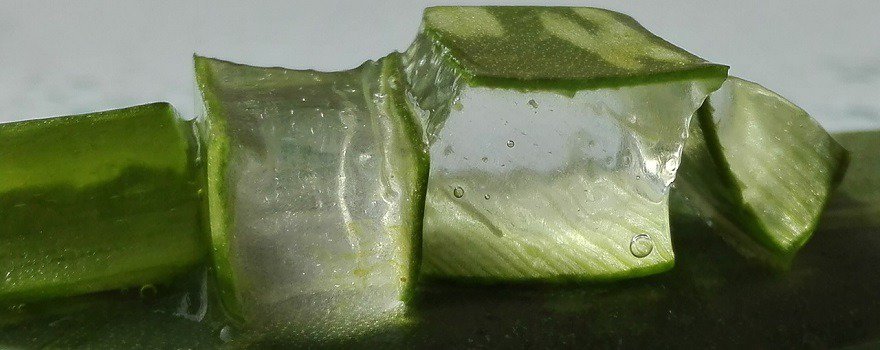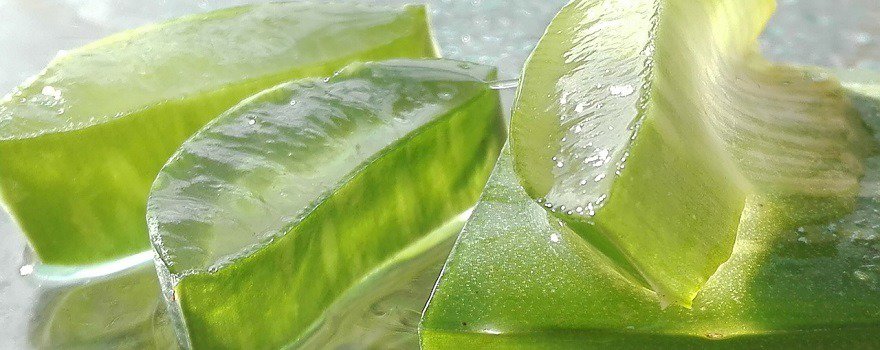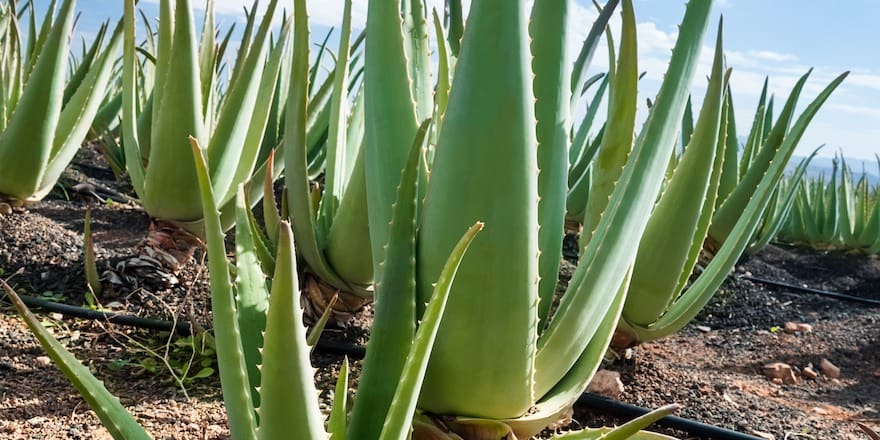The benefits of organic aloe vera
Aloe vera, a traditional natural remedy
The origin of aloe vera is uncertain, but the plant was already used in ancient Egypt as a medicinal plant. It is now cultivated in many regions of the world, primarily in tropical areas because it is sensitive to frost. As it was introduced into different regions of the world, traditional healers incorporated this plant into their pharmacopoeias: it thus became part of Ayurvedic medicine and traditional Chinese medicine from the 10th century, and part of traditional Native American medicine from the 17th century.

The aloe vera (also called Barbados aloe) has multiple uses: it is sold as an ornamental plant because it is relatively easy to grow indoors. In France, it can be cultivated in the Mediterranean regions and in Corsica, and of course also in the overseas departments and territories (DOM-TOM). It is widely used in cosmetics; it is a good natural remedy for certain skin conditions and can be consumed as a food.
Organic aloe vera: an ally for skin hydration
In cosmetics, what is used is the aloe vera gel derived from the pulp inside the leaves. Aloe vera, being a succulent plant, retains water in this “gel” which therefore has highly regarded moisturizing properties. Aloe vera gel is used to hydrate the skin without making it greasy. It can be used on oily and acne-prone skin because it tightens the pores and regulates sebum.
Aloe vera is rich in antioxidants, which help fight cellular aging. The organic aloe vera gel is therefore a very good natural anti-wrinkle product. Aloe vera gel can be used daily as a base for makeup removal in combination with floral water on all skin types.
Organic aloe vera gel can be purchased pure or mixed with other active ingredients. You can also extract it yourself from fresh aloe vera leaves.
Organic aloe vera, a good natural remedy
Aloe vera leaves are traditionally used to treat burns. You can use cut leaves or the gel to soothe superficial burns and sunburns, or to relieve the skin after sun exposure. Aloe vera gel is also a good soothing treatment for insect bites and itching.

When taken internally, aloe vera is primarily used for occasional constipation. What is consumed in that case is the dried aloe latex. Health authorities recognize the effectiveness of aloe vera as a natural laxative, but recommend moderate use, as excessive intake can lead to intestinal irritation.
Aloe vera may also be effective against parasites and fungi, and against genital herpes in men.
Organic aloe vera in the kitchen as well
The mucilage (the inner gelatinous part) of aloe vera can be consumed as a food. It is a plant rich in vitamins A, B, C, and E, and a good source of calcium and potassium. Its mild taste allows it to be incorporated into many savory or sweet recipes.
Organic aloe vera juice can be drunk as is or mixed into fruit juices, smoothies, or frozen (sorbets, granitas…) The aloe vera cubes can be cut into salads, verrines, cold soups, or desserts.

It is preferable to consume raw aloe vera to preserve its texture and crunch. Cooked, it would lose much of its gastronomic and nutritional value.
Why consume organic aloe vera?
Prefer organic aloe vera
It is preferable to consume organic aloe vera to avoid any pesticide residue in the finished product. Whether ingested or applied to the skin, aloe vera is better for your health when it comes from organic farming. Non-organic or conventional aloe vera can be high in pesticide and fungicide residues and may come from monocultures that contribute to deforestation in tropical regions.
Organic certification helps guarantee the absence of pesticides in consumed products and provides a certain level of product traceability: we choose organic aloe vera!
Some brands offer products made with organic and fair-trade aloe vera: it’s ideal, because you know it is produced under optimal social and environmental conditions without exploiting workers.
Choose organic aloe vera
It all depends on how you want to use aloe vera:
- Pour un usage cosmétique, il est préférable d’acheter du gel d’aloe vera bio pur que l’on peut utiliser tel quel sur la peau ou mélangé avec des huiles ou des hydrolats.
- Pour un usage médicinal, on utilise des extraits de latex séché ou du jus d’aloe vera sur avis d’un médecin ou d’un naturopathe.
- Pour un usage alimentaire, on choisit des feuilles d’aloe vera bio fraîches. On en trouve souvent au rayon fruits et légumes des magasins bio. On choisit des feuilles bien charnues, pas trop foncées ni fripées. On peut également utiliser l’aloe vera frais pour la peau en extrayant la chair. Il est également possible de cultiver l’aloe vera pour en « casser » une branche en cas de besoin.
- Quoi qu’il en soit, acheter des aliments ou cosmétiques à base d’aloe vera bio permet également de garantir des produits sans conservateurs et arômes de synthèses pouvant être dangereux pour la santé.
Precautions for using aloe vera
If you buy aloe plants, you need to purchase edible aloe vera: some varieties are toxic); ask the garden center staff for advice. If you grow it at home, do not use toxic pesticides or herbicides — aloe doesn’t need them to grow.
It is necessary to be very vigilant when cutting aloe vera to extract the pulp. Indeed, the latex (the yellowish sap) is toxic when consumed as is. It is therefore essential to ingest only the gelatinous part and under no circumstances the entire aloe vera pulp. If the gel comes into contact with the latex, do not consume the plant!



